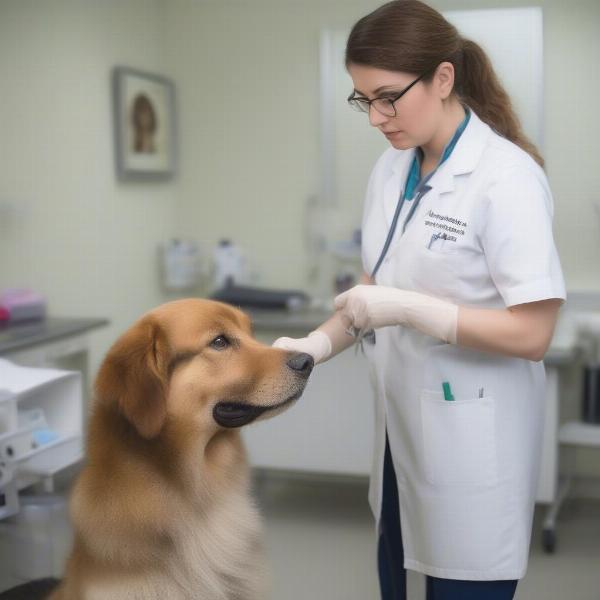Dog owners often find their furry friends engaging in peculiar behaviors, and eating mulch is one such puzzling habit. While seemingly harmless, mulch ingestion can pose potential health risks to your canine companion. This article will delve into the reasons why dogs eat mulch, the potential dangers involved, and effective strategies to prevent this behavior.
Why Do Dogs Eat Mulch?
Dogs explore the world through their mouths, and mulch, with its earthy scent and texture, can be appealing. Puppies, especially, are notorious for this behavior due to their inquisitive nature and teething discomfort. Boredom, nutritional deficiencies, and underlying medical conditions like pica (the persistent craving and consumption of non-nutritive substances) can also contribute to mulch-eating habits in dogs. Sometimes, dogs simply enjoy the taste or texture of certain types of mulch.
Dangers of Mulch Ingestion in Dogs
While some mulches are relatively harmless, others can be toxic. Cocoa mulch, made from cocoa bean shells, contains theobromine, a compound toxic to dogs. Even small amounts of cocoa mulch can cause vomiting, diarrhea, increased heart rate, seizures, and even death. Wood mulch, while less toxic, can cause gastrointestinal blockages, especially if ingested in large quantities. Dyed mulches can contain harmful chemicals that can irritate a dog’s skin, mouth, and digestive tract. Additionally, moldy mulch can contain mycotoxins, leading to tremors, seizures, and other neurological issues.
How to Stop Your Dog from Eating Mulch
Preventing mulch ingestion requires a multi-faceted approach:
-
Remove the temptation: If possible, remove or replace potentially harmful mulch with dog-friendly alternatives like pine bark, cedar chips, or shredded leaves. You can even consider creating a designated dog-friendly area in your yard with safe ground cover like dog pee grass saver.
-
Provide a stimulating environment: A bored dog is more likely to engage in destructive behaviors like eating mulch. Ensure your dog receives adequate physical and mental stimulation through walks, playtime, and interactive toys.
-
Training and reinforcement: Train your dog to “leave it” or “drop it” when they approach mulch. Positive reinforcement, such as rewarding them with treats for obeying commands, is highly effective.
-
Address nutritional deficiencies: If you suspect your dog’s mulch-eating stems from a nutritional deficiency, consult your veterinarian. They can recommend appropriate dietary changes or supplements.
-
Supervise your dog: When outdoors, especially in areas with mulch, supervise your dog closely. If you catch them in the act, redirect their attention with a toy or a game. For dogs that spend a lot of time outside, you may consider an outside dog toilet.
When to Contact Your Veterinarian
If your dog exhibits symptoms like vomiting, diarrhea, lethargy, loss of appetite, or any other unusual behavior after ingesting mulch, contact your veterinarian immediately.  Chó tại phòng khám thú y Early intervention is crucial, especially if the ingested mulch is potentially toxic. Be sure to inform your vet about the type and amount of mulch ingested.
Chó tại phòng khám thú y Early intervention is crucial, especially if the ingested mulch is potentially toxic. Be sure to inform your vet about the type and amount of mulch ingested.
Conclusion
While a seemingly innocuous behavior, dog eating mulch can have serious consequences. By understanding the reasons behind this behavior and implementing preventive strategies, you can keep your canine companion safe and healthy. Always opt for dog-friendly landscaping materials and ensure your dog’s nutritional needs are met. Remember, vigilant supervision and consistent training are key to preventing mulch ingestion and other potentially harmful behaviors. Don’t hesitate to consult your veterinarian if you have any concerns about your dog’s health or behavior.
FAQ
-
What is the most dangerous type of mulch for dogs? Cocoa mulch is the most dangerous due to its theobromine content.
-
Can dogs eat pine bark mulch? Pine bark mulch is generally considered safe for dogs, but large pieces can cause blockages.
-
Why is my dog suddenly eating mulch? Sudden changes in behavior can be due to boredom, stress, dietary changes, or underlying medical conditions.
-
What should I do if my dog eats a large amount of mulch? Contact your veterinarian immediately.
-
Are there any dog-friendly landscaping alternatives to mulch? Yes, consider using shredded leaves, pine bark, cedar chips, or vines safe for dogs.
ILM Dog is a leading online resource dedicated to providing expert advice and information on all aspects of dog care. From breed selection to health and nutrition, training, and grooming, we offer practical guidance for dog owners worldwide. We are committed to helping you navigate the joys and challenges of dog ownership, empowering you to provide the best possible care for your furry friend. For further assistance and tailored advice, please contact us via email at [email protected] or phone at +44 20-3965-8624. ILM Dog is your trusted partner in dog care.